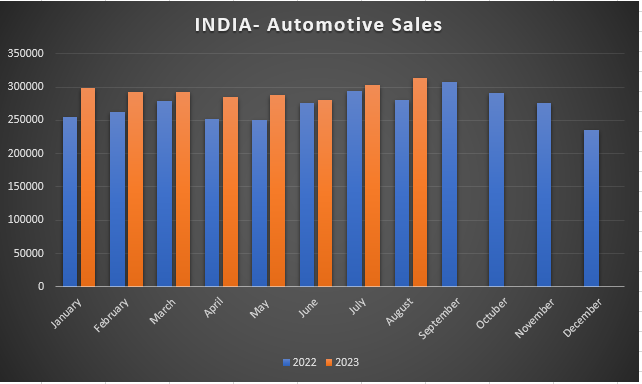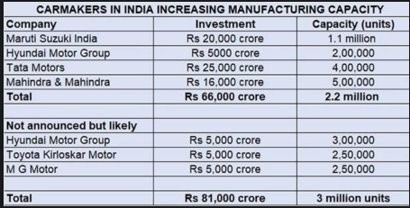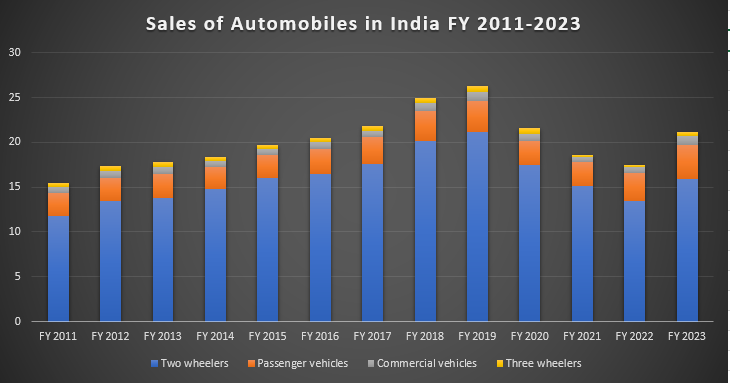TEAL’s Automation Solutions Supporting Indian Automotive Growth

As India's automotive industry revs up its engines for a new era, the roadmap got etched with innovation, sustainability, and transformative growth"grandviewresearch" of 11.3% CAGR (Compound Annual Growth Rate) from 2020 to 2027. Amidst this compelling journey, a pioneering force stands tall - TEAL (Titan Engineering and Automation Limited). As the Indian automotive sector navigates its path to progress, TEAL emerges as an innovator fuelling the engine of transformation. In this blog, we will explore the automotive industry in India, its growth, and how TEAL is supporting this growth with their innovative turnkey assembly lines and automation solutions.
Current Landscape: Paving the Way for Automotive Triumph
The Indian automotive industry is currently undergoing a surge of rapid growth. India boasts the distinction of having the world's third-largest automobile market, being the largest producer of three-wheelers, passenger vehicles, and tractors, and ranking as the second-largest manufacturer of two-wheelers. With a growing appetite for electric vehicles (EVs) and an increasing emphasis on safety improvements, each development presents a unique opportunity for innovation. Within this dynamic landscape, TEAL has emerged as a top-notch industrial automation solution provider, charting the course for the industry's future endeavours. Let’s take a glimpse at the growth of the Indian Automotive Industry in recent years.

Accelerating Growth: Investments Fuelling Automotive Triumph
In the symphony of India's automotive resurgence, investments are the instrumental crescendo that propels the industry forward. Let's look at the recent investment notes that have reverberated through the Indian automotive landscape.
Major players are making strategic investments "ibef.org" to fuel the electric vehicle (EV) revolution. MG Motor India's US$ 100 million investment in January 2023 and Mahindra & Mahindra's monumental Rs 10,000 crore investment in December 2022 highlight a dedicated commitment to India's EV future. Maruti Suzuki's Rs. 7,000 crore investment in November 2022 and TVS Motor's Rs 1,000 crore commitment in July 2022 underscore a transformative focus on innovation and electrification.
Additionally, Tata Motors' ambitious Rs. 24,000 crore investment and Hyundai's colossal US$ 79.2 billion investment further emphasize a steadfast drive towards electrification. TEAL's expertise in power modules, thermal management in electric vehicles, and automation solutions perfectly complements this industry-wide dedication to a greener, sustainable automotive landscape.

Export Success: Driving International Growth
In addition to these significant investments, India's automotive sector has witnessed substantial growth in exports. The total number of automobile exports surged from 4,134,047 in 2020-21 to 5,617,246 in 2021-22, marking an impressive growth "business-standard" of 35.9%. This remarkable uptick in exports underscores India's growing presence on the global automotive stage. It exemplifies the industry's commitment to quality, innovation, and excellence, values that TEAL shares and embodies in its solutions.
The Two-Wheeler Revolution: TEAL's Assembly Line Solutions
The Indian automotive industry has witnessed remarkable growth in recent years, and one segment that has particularly stood out is the two-wheeler market. With a burgeoning population, urbanisation, and the need for affordable and efficient transportation, two-wheelers have become the go-to choice for millions of Indians. This segment's growth trajectory has been nothing short of phenomenal.

India's EV market is rapidly evolving, driven by diverse stakeholder demands. By 2030, India aims to become the largest EV market globally, presenting an investment ".ibef.org" opportunity exceeding US$ 200 billion in the next 8-10 years. EV registrations surged by 168%, soaring from 120,000 in 2020 to 330,000 in 2021.
As the two-wheeler segment continues to expand, precision, efficiency, and quality become paramount in manufacturing processes. This is where TEAL steps in with its cutting-edge assembly line solutions. TEAL provides critical automation solutions for various automotive parts in the two-wheeler manufacturing process.
Some of the specific automotive parts for which TEAL offers assembly line solutions include:
- EV Battery, Drive Motors
- eDCU module, ARAS (Autonomous Rider assistance system)
- Engine, Crank Case, Starter Motor & Drive Motors
- Fuel modules, Spark Plug
- Frame Line (Front and Rear)
Driving Forward: Expected Growth in Four-Wheelers
The Indian automotive landscape is on the cusp of transformative growth, and one of the most significant contributors to this surge is the 4-wheeler segment. The demand for cars in India has been steadily rising, driven by factors like increasing disposable incomes, urbanisation, and the need for personal mobility. This segment's expected growth promises to reshape the automotive industry.
The four-wheeler segment in India has been experiencing robust growth, with various automakers launching new models, catering to diverse consumer preferences. From compact hatchbacks to luxurious SUVs and electric vehicles (EVs), the choices for Indian consumers have expanded significantly. In 2022-23, its market grew by 174% year-over-year "auto.economictimes.indiatimes", with over 53,000 units sold. The 4-wheeler EV market in India is expected to continue to grow rapidly in the coming years. A recent report by Bain & Co. predicts that the 4W EV market in India could reach 1 million units per year by 2030.
As the 4-wheeler segment continues to grow, the need for precision, efficiency, and innovation in manufacturing processes becomes paramount. This is where TEAL plays a pivotal role with its advanced automation solutions. TEAL provides critical assembly lines for a wide range of automotive parts in the 4-wheeler manufacturing process.
Some of the specific automotive parts for which TEAL offers assembly line solutions include:
- Engine Control Unit (ECU), Auto Electronic products, Telematic control unit, Radar, ADAS ( Advance driver assistance system), ESC (Electronic stability control), Invertor, DC-DC convertor, On Bord charger.
- Auto safety products like airbags, seatbelt retainers, and Airbag control units.
- Heating, Ventilation and Air Conditioning (HVAC), Blower motors
- Transmission system, eAxle, Drive motors , Alternator, Engine
- Stater motors, Wiper Motors
- Fuel pump, Fuel injectors, Fuel filter
- Door Latch, Window regulators
- Engine Cooling systems and HVCH (High voltage coolant heater)
Current Demand and Growth of the Auto Electronic Component Market in India
The automotive electronics market in India is expected to grow at a CAGR of 17% from 2022 to 2027, reaching a value of over $18 billion by 2027."business-standard"
This growth is being driven by a number of factors, including:
- Increasing demand for passenger vehicles: The demand for passenger vehicles in India is expected to grow in the coming years, as the country's economy continues to grow and the middle class expands.
- Rising demand for electronic features in vehicles: Consumers are increasingly demanding electronic features in their vehicles, such as advanced driver assistance systems (ADAS), Forward Collision Warning (FCW), Automatic Emergency Brake (AEB), Adaptive Cruise Control (ACC), Blind Spot Warning (BSW), Parking Assist, Telematics communication system, Driving support system ECU, infotainment systems, and connectivity features.
- Government initiatives to promote the adoption of electric vehicles: The Indian government is offering a number of incentives to promote the adoption of electric vehicles, which are expected to drive the demand for automotive electronics components.
Critical Aspects for Growth in Automotive Industry: Safety, Sustainability, and Innovation
In the ever-evolving automotive industry, three pivotal aspects serve as the driving force behind its growth and transformation. These aspects not only shape the industry's future but also define the path toward a more dynamic, responsible, and innovative automotive landscape.
Safety: A Cornerstone of Automotive Progress: Safety is undeniably the cornerstone of the automotive sector. With millions of lives at stake on the roads, the importance of stringent safety standards cannot be overstated. From crash tests to advanced driver-assistance systems (ADAS), the industry is raising the bar for vehicle safety continuously. TEAL plays a pivotal role in this pursuit, providing cutting-edge assembly lines for critical safety components such as airbags, anti-lock braking systems (ABS), ESC (Electronic stability control), and advanced sensor systems. By ensuring the precise assembly and integration of these safety features, TEAL contributes to a safer and more responsible automotive ecosystem.
Sustainability: The Road to Eco-Conscious Mobility: As environmental concerns intensify, sustainability takes centre stage in the automotive industry. The adoption of biofuels, electric vehicles (EVs), and eco-friendly manufacturing processes is ushering in a new era of eco-conscious mobility. Biofuels play a crucial role in reducing carbon emissions and minimising the industry's environmental footprint. TEAL is committed to promoting sustainability by providing automated assembly line solutions for components essential to EVs and hybrid vehicles. By supporting the manufacturing of eco-friendly automobiles, TEAL contributes to a more sustainable and greener future for the automotive sector.
The Indian government has displayed a proactive stance in promoting biofuels to address environmental challenges and energy security concerns. The National Policy on Biofuels introduced in 2018 emphasised the use of biodiesel to enhance India's energy security. Union Minister Nitin Gadkari has been a strong advocate, promoting biodiesel to minimize oil imports "pib.gov". Although India presently contributes only 1% of the world's biofuel production, the government is actively supporting domestic entities like UCO aggregator and Aris Bioenergy to invest in and bolster the biofuel market.
Innovation: Forging the Path Forward: Innovation is the engine that propels the automotive industry into the future. From autonomous vehicles to connected car technologies, the industry thrives on pushing the boundaries of what's possible. TEAL stands at the forefront of this drive for innovation, offering advanced automation solutions that enhance manufacturing precision, efficiency, and quality. By integrating innovation into the assembly process, TEAL empowers automakers to stay competitive and meet the ever-evolving demands of consumers.
In a landscape where safety, sustainability, and innovation intersect, TEAL plays a pivotal role in shaping the future of the automotive industry. As a trusted partner, TEAL continues to contribute to the growth and evolution of this dynamic sector, driving it toward a safer, more sustainable, and innovative tomorrow.
TEAL: Igniting a Revolution in Indian Automotive Innovation
In the journey towards the future of the Indian automotive industry, TEAL's automation solutions stand as a beacon of promise and progress. Our commitment to driving growth, innovation, and safety remains unwavering.
With each automation solution we provide, we pledge to elevate the standards of precision and excellence in automotive manufacturing. We promise to contribute to a safer, more sustainable, and innovative future for the industry.
As the wheels of progress turn, TEAL's journey continues, harmonising with the automotive industry's aspirations for a brighter, more promising tomorrow. Together, we drive forward, forging new paths, setting new benchmarks, and shaping a future where the Indian automotive industry thrives, fuelled by the promise of innovation and progress.
As we conclude this blog, we extend a resounding invitation to businesses and visionaries alike. If you're seeking cutting-edge automation solutions to navigate the ever-evolving automotive landscape, TEAL is your partner of choice. Collaborate with us to redefine the future of mobility. Together, we can harmonise innovation, safety, and efficiency to compose a brighter tomorrow.
Frequently Asked Questions
The terms "automobile" and "automotive" are often used interchangeably, but there is a subtle difference between them.
• Automobile is a noun that refers to a self-propelled vehicle that uses wheels for locomotion. It is used to refer to passenger cars, but it can also refer to other types of vehicles, such as trucks, buses, and motorcycles.
• Automotive is an adjective that refers to anything related to automobiles. It can be used to describe the design, manufacture, or operation of automobiles. It can also be used to describe a company that makes or sells automobiles.
In other words, an automobile is a type of vehicle, while automotive is an adjective that describes anything related to vehicles.
The global automotive market is expected to reach $3.9 trillion in 2023, according to a report by McKinsey & Company. This represents an increase of 5.4% from 2022.
The growth of the automotive market is being driven by a number of factors, including:
• Increasing demand for passenger vehicles in emerging markets, such as China and India
• Growing popularity of electric vehicles
• Rising demand for advanced driver assistance systems (ADAS) and other safety features
• Increasing investment in autonomous vehicles
The Asia-Pacific region is the largest automotive market in the world, accounting for over 50% of global sales in 2022. North America and Europe are the second and third-largest markets, respectively.
